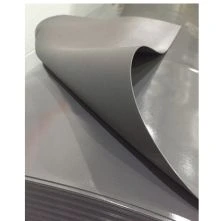Get A Quote
BIS Certification for Poly Vinyl Chloride (PVC) Geomembranes IS 15909: 2020

Poly Vinyl Chloride (PVC) Geomembranes are high-performance waterproofing materials used in various applications such as landfill liners, water reservoirs, irrigation canals, and containment structures. Made from flexible and durable PVC, these geomembranes offer excellent resistance to chemicals, UV radiation, and weathering.
Their superior flexibility allows for easy installation, even in complex site layouts. With high tensile strength and impermeability, PVC geomembranes effectively prevent water seepage and contamination, ensuring environmental protection and efficient water resource management. These geomembranes are widely recognized for their long lifespan and reliability in demanding conditions.
Introduction
BIS certification for Poly Vinyl Chloride (PVC) Geomembranes
ensures that these products comply with the rigorous quality and performance
standards specified under IS 15909:2020.
As mandated by the Geo Textiles (Quality
Control) Order, 2022, issued by the Ministry of Textiles, manufacturers of
PVC geomembranes must obtain BIS certification (ISI Mark) before selling their
products in India. The certification process involves comprehensive testing of
parameters such as tensile strength, elongation, water permeability, and
chemical resistance to ensure suitability for critical applications. The ISI
mark provides assurance to buyers and users that the product meets Indian
standards, promoting safety, reliability, and environmental sustainability.
Why is BIS Certification Necessary for Poly Vinyl Chloride (PVC) Geomembranes?
BIS certification is vital for PVC Geomembranes to ensure their quality, safety, and reliability in waterproofing and containment applications. Under the Geo Textiles (Quality Control) Order, 2022, BIS certification is mandatory to regulate product quality and prevent the distribution of substandard geomembranes. Certification guarantees compliance with IS 15909:2020, ensuring that the geomembranes possess adequate strength, impermeability, and resistance to environmental factors such as chemicals and UV exposure. The ISI mark reassures stakeholders about the product’s adherence to national standards, facilitating its use in critical infrastructure and environmental protection projects. Manufacturers who fail to comply face penalties under the Bureau of Indian Standards Act, 2016.
Overview of Indian Standard IS 15909:2020
IS 15909:2020 specifies the technical
requirements and testing methods for Poly
Vinyl Chloride (PVC) Geomembranes used in waterproofing and containment
applications. The standard outlines parameters such as thickness, tensile
strength, elongation at break, tear resistance, and water impermeability to
ensure the product’s durability and performance. It also includes guidelines
for chemical resistance and UV stability, critical for geomembranes used in
exposed or harsh environments. Testing methods detailed in the standard
validate the geomembranes' ability to meet specified quality benchmarks.
Compliance with IS 15909:2020
ensures the production of reliable PVC geomembranes suitable for long-term use
in sustainable water and waste management systems.
Process for BIS Certification
The BIS
certification process for Poly Vinyl Chloride (PVC) Geomembranes involves
multiple steps, designed to thoroughly evaluate a product's compliance with the
required standards. Here is a general overview of the certification process:
1. Application Submission: Manufacturers
must submit an application form along with required documentation to BIS.
2. Documentation Review: BIS reviews the
submitted documents to ensure completeness and correctness.
3. Factory Inspection: BIS officials
conduct an on-site inspection of the manufacturing facility to assess the
production process and quality control measures.
4. Sample Testing: Product samples are
taken and tested in BIS-approved laboratories to verify compliance with Indian
standards.
5. Certification Grant: Upon successful
completion of the inspection and testing, BIS grants certification, allowing
the manufacturer to use the BIS mark on their products.
Documents Required for BIS Certification
To apply for BIS certification, manufacturers need to submit the following documents:
● Application form
● Manufacturing process details
● Quality control plan
● Test reports from BIS-approved laboratories
● Factory layout and equipment details
● Proof of business registration
● Product specifications and technical details
● Declaration of conformity to Indian standards
Additionally, manufacturers may be required to provide proof of compliance with environmental and safety regulations, depending on the specific type of product being certified.
BIS ISI Mark Certification Costing And Timeline
To Know The Process in Detail, Please Visit:
Under BIS Registration Products ISI and CRS
Conclusion
BIS certification
for Poly Vinyl Chloride (PVC) Geomembranes is essential to ensure adherence to
quality and safety standards as per IS 15909 : 2020. By complying with the
mentioned Quality control order, certified products provide reliable
performance, enhance consumer safety, and reinforce the credibility of
manufacturers in the Indian market.
Navigating the BIS certification process can be challenging, especially for small and medium-sized enterprises. EVTL India is a leading consultancy firm dedicated to assisting manufacturers in obtaining BIS certification (ISI Mark) efficiently. With expertise in managing BIS portal submissions, documentation, and regulatory fees, EVTL India ensures a smooth and successful certification process. By choosing EVTL India, manufacturers can enhance their product's marketability both in India and internationally, securing a competitive edge. Additionally, EVTL India provides ongoing support post-certification, helping manufacturers maintain compliance with BIS standards and renew their licenses as needed.
Free Call Back
Latest News & Update
📅 BIS Critical Component List (CCL) Updates for Solar PV Modules
🕒 BIS Fee Concessions for MSMEs and Startups | EVTL India
📅 Guidelines for Implementation of Essential Requirements for Security of CCTV
🕒 Omnibus Technical Regulation (OTR) Amendment Order, 2025
🕒 Extension of Timeline for Filing Annual Returns by Battery Producers
📅 Extension of Timeline for Filing Quarterly and Annual Returns for E-Waste
🕒 Extension of Concurrent Running Period for IS 302-1: 2008 and IS 302 (Part 1): 2024
🕒 BIS Guidelines for Grant of Licence (GoL) | EVTL India
📅 CPCB Guidance on filing of Application, Fees and more
🕒 CPCB Notification on Labelling of Plastic Packaging
📅 Mandatory Compliance for Input Materials of Steel and Steel Products for Imports
🕒 BIS Guidelines for Scheme-X Certification for OTR-Regulated Products
📅 BIS Upgrades Product Certification License Numbers to 10-Digit Series
🕒 BIS Certification No Longer Mandatory for 14 Chemical & Polymer Categories
Why Choose EVTL INDIA
Expertise in Indian Regulatory Standards
End-to-End Support
Trusted by Top Indian & Global Brands
Fast Processing & Transparent Pricing
Strong Liaison with Indian Authorities
Company Profile














